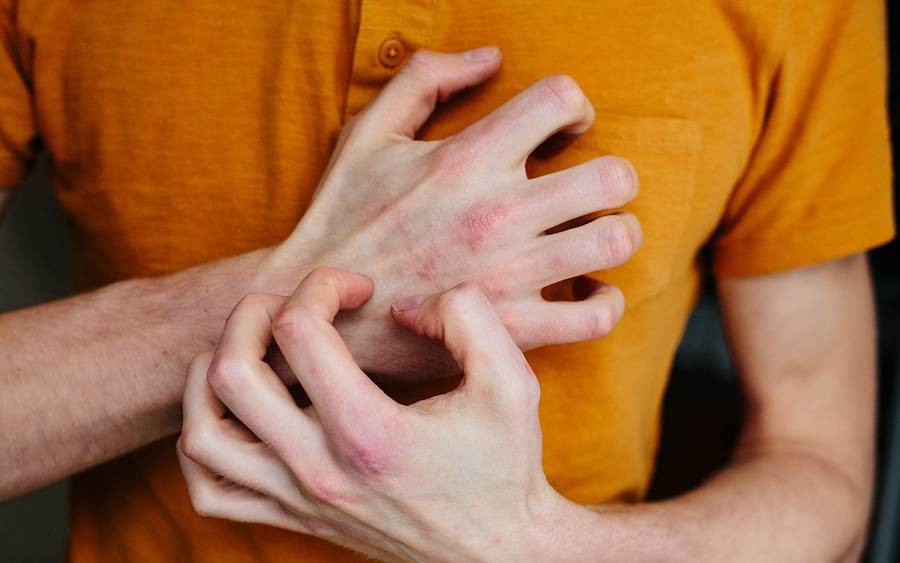
Many healthcare professionals recognise the significant connection between psychological wellbeing and dermatological health. In contemporary society, this relationship has become increasingly important as modern lifestyles contribute to heightened tension levels.
A recent survey revealed that 90% of medical experts agree that intense psychological pressure can worsen various dermatological issues. The body responds to these pressures by releasing hormones like adrenaline and cortisol, which can directly affect physical wellbeing.
These hormonal changes, combined with disruptions to sleep and nutrition patterns, create challenges for the body’s largest organ. Research shows that persistent tension can compromise the skin’s natural barrier function, making it more susceptible to environmental irritants.
This comprehensive guide explores the complex interplay between mental health and dermatological conditions. It draws upon expert insights from organisations like Surgical Arena Ltd and The Psychodermatologist to provide evidence-based information on management strategies and professional treatment options.
Key Takeaways
- The connection between psychological pressure and dermatological health is well-established among medical professionals
- Stress hormones like cortisol can directly impact skin barrier function and overall physical wellbeing
- Modern lifestyle factors contribute to the prevalence of stress-related dermatological conditions
- There exists a bidirectional relationship where skin problems can create additional psychological pressure
- Professional guidance from specialists can provide effective management strategies
- Evidence-based approaches combine medical research with practical implementation techniques
- Comprehensive treatment considers both mental health and dermatological aspects simultaneously
Introduction and Overview
Modern dermatological practice acknowledges the profound influence of psychological factors on cutaneous conditions. This section explores the foundational concepts behind this relationship.
Setting the Context
Historical medical literature documented various dermatological presentations. However, explicit recognition of psychological triggers gained clinical attention in recent decades.
Contemporary life in the United Kingdom creates environments where sustained pressure affects individuals across demographics. Work demands and financial concerns intensify these impacts significantly.
Relevance to Today’s Lifestyle
Digital connectivity and demanding schedules characterise modern existence. These factors contribute to psychological strain that manifests physically.
The body’s largest organ often reveals internal struggles first. Understanding this connection provides practical relevance for millions experiencing related conditions.
| Aspect | Historical Understanding | Contemporary Perspective |
|---|---|---|
| Primary Focus | Physical symptoms only | Mind-body interconnection |
| Treatment Approach | Topical applications | Comprehensive management |
| Clinical Recognition | Limited awareness | Established specialty |
| Patient Impact | Localised treatment | Holistic wellbeing |
Evidence-based approaches combine medical research with practical implementation. They address unique challenges of current lifestyles effectively.
Understanding stress and chronic skin disease
The interplay between psychological pressure and persistent dermatological issues creates a complex, cyclical relationship. This section clarifies what constitutes these conditions and explores their real-world effects.
Definition and Overview
These long-term dermatological conditions require ongoing management. They are not simply short-term problems.
A bidirectional relationship is central. Psychological strain can trigger or intensify physical symptoms. Conversely, visible symptoms often increase emotional distress.
This cycle is well-documented in comprehensive research. It highlights the powerful skin-brain connection. Conditions like acne or eczema frequently demonstrate this pattern.
Impact on Daily Life
Living with a visible skin condition affects multiple areas. It can influence self-esteem and social confidence.
Daily routines involve managing treatments and potential flare-ups. The unpredictability adds another layer of difficulty.
This can impact professional life and personal relationships. The overall quality of life for many people is significantly affected. Understanding this full impact is crucial for effective care.
Physiological Impact: How Stress Affects the Skin
The body’s reaction to psychological pressure initiates a cascade of physiological events that directly manifest on the skin’s surface. This process begins deep within the nervous system.
Hormonal Responses and Cortisol Levels
When faced with a perceived threat, the hypothalamic-pituitary-adrenal (HPA) axis activates. This system triggers the release of hormones, including cortisol.
In short bursts, this hormonal response is protective. However, sustained high cortisol levels become problematic. Elevated cortisol signals sebaceous glands to produce more oil.
This excess oil creates conditions favourable for acne development and clogged pores. It is a direct example of how internal chemistry affects external health.
Immune System Alterations and Inflammation
Prolonged pressure also disrupts normal immune function. The system’s inflammatory response can become dysregulated.
A cascade of inflammatory mediators, like cytokines, is released. This contributes to redness, swelling, and discomfort in the skin.
In some cases, these immune alterations can trigger autoimmune responses. The body’s defence mechanisms may mistakenly attack healthy cells, worsening conditions like psoriasis.
Understanding these mechanisms shows why managing pressure is fundamental. It addresses the root physiological causes of many skin complaints.
Common Stress-Related Skin Conditions
Numerous dermatological presentations show predictable worsening patterns when individuals experience psychological pressure. These visible physical symptoms often serve as external markers of internal emotional states.
Acne, Rosacea and Hives
Acne frequently flares during stressful periods through hormonal pathways. Elevated cortisol increases testosterone levels, leading to blocked sebaceous glands.
Rosacea demonstrates a remarkable connection with emotional triggers. A National Rosacea Society survey found 91% of sufferers report flare-ups during psychological strain.
Hives represent acute stress responses where histamine release creates itchy welts. These raised rashes typically resolve as psychological pressure diminishes.
Eczema and Psoriasis Flare-Ups
Eczema experiences worsening through the itch-scratch cycle. Stress-induced scratching damages the skin barrier, increasing inflammation.
Psoriasis flare-ups occur when stress chemicals boost inflammatory responses. This accelerates skin cell turnover, creating characteristic plaques.
Both conditions require management approaches addressing psychological factors. Comprehensive care recognises the mind-skin connection in these inflammatory presentations.
Managing Stress and Skin Symptoms
Effective control of these interconnected issues requires a dual approach. This involves practical daily habits and psychological techniques to build resilience.
Self-Care Strategies and Skincare Routines
Consistency is paramount for maintaining dermatological health. Individuals should adhere to a simplified routine, especially when feeling pressured.
Gentle cleansers and non-comedogenic moisturisers with sunscreen form a solid foundation. Harsh products can further irritate sensitive conditions.
Lifestyle choices offer significant support. Prioritising hydration, balanced nutrition, and regular exercise contributes to overall wellbeing. Avoiding dietary triggers like alcohol and processed foods is also beneficial advice.
Emotional Resilience and Stress Management Techniques
Building inner strength helps mitigate the impact of external pressures. This involves creating space for personal time and learning assertive communication.
Specific practices can provide immediate help. Deep breathing, mindfulness, and journaling are effective techniques for calming the nervous system.
Establishing healthy boundaries is crucial for mental health. Learning to say no and prioritising restorative activities are key components of long-term management. This comprehensive advice addresses both visible symptoms and their underlying causes.
Professional Insights: Consultation and Treatment Options
Seeking expert dermatological guidance represents a significant step towards effective long-term management. While self-care provides initial support, professional input becomes essential when symptoms persist.
This section explores the consultation process and identifies when specialist help is most beneficial.
Expert Guidance from Dermatologists
A dermatologist begins with a comprehensive assessment. They review medical history and examine affected areas thoroughly.
Specialist centres like Surgical Arena Ltd offer experienced professionals who understand complex presentations. They may recommend diagnostic tests to identify specific triggers.
The benefits include personalised treatment plans based on individual circumstances. Patients receive evidence-based advice about safe, effective interventions.
When to Seek Professional Help
Consultation becomes necessary when self-management proves insufficient. Persistent symptoms despite consistent care warrant professional evaluation.
Rapidly worsening conditions or significant quality of life impact are clear indicators. Symptoms accompanied by pain or systemic signs require immediate attention.
Early intervention prevents conditions from becoming more severe. It addresses both physical symptoms and associated emotional distress effectively.
Establishing a collaborative relationship with a dermatologist ensures ongoing support. Treatment plans can be adjusted as circumstances change over time.
Innovative Surgical and Advanced Therapies
For individuals facing ongoing challenges with visible dermatological symptoms, surgical and integrated approaches provide comprehensive solutions. These advanced methodologies address cases where conventional management yields limited improvement.
Exploring Surgical Solutions for Persistent Conditions
Laser therapy represents a significant advancement in treating stubborn manifestations. Fractional laser resurfacing precisely targets damaged tissue while preserving healthy areas.
This technology effectively reduces scarring and redness from previous flare-ups. Pulsed dye lasers specifically address vascular components in conditions like rosacea.
Chemical peels offer another dimension of advanced care. Ranging from superficial to deep intensities, these treatments improve texture and appearance.
Each option requires careful candidate selection by qualified specialists. Recovery planning varies significantly based on treatment depth.
Insights from The Psychodermatologist
The Psychodermatologist approach recognises the interconnected nature of psychological and dermatological health. This specialty combines traditional dermatological treatments with psychological interventions.
Integrated methodology addresses both physical symptoms and accompanying emotional distress. The bidirectional relationship between mind and body receives focused attention.
This comprehensive perspective often yields improved long-term outcomes. Patients benefit from coordinated care addressing multiple aspects of their condition.
Advanced therapeutic interventions should form part of personalised treatment plans. Specialist consultation ensures appropriate selection based on individual circumstances and expected results.
Holistic Approaches and Lifestyle Adjustments
Lifestyle adjustments form the cornerstone of sustainable management for conditions influenced by psychological factors. These comprehensive strategies address both mental wellbeing and physical manifestations through integrated daily practices.
Consistent implementation creates resilience against external pressures that might trigger flare-ups. This approach recognises the interconnected nature of overall health.
Mindfulness, Exercise and Nutritional Strategies
Regular physical activity serves as a powerful tool for managing psychological pressure. Exercise improves circulation and supports immune function.
Mindfulness practices help individuals recognise triggers for stress-related skin conditions. Techniques like meditation develop healthier response patterns.
Nutritional choices significantly impact inflammatory responses within the body. Anti-inflammatory diets rich in antioxidants support skin barrier function.
These strategies work synergistically to prevent conditions like hair loss from developing. They address root causes rather than just symptoms.
Incorporating Relaxation into Daily Routines
Quality sleep provides essential recovery time for both mind and body. Aiming for 7-8 hours nightly supports skin regeneration.
Relaxation practices become most effective when integrated consistently. Simple activities like evening walks or calming baths reduce tension.
Establishing healthy boundaries prevents individuals from becoming overwhelmed. Learning to say no protects against excessive psychological pressure.
These routines help maintain balance when people feel stressed. They contribute significantly to managing stress-related skin presentations.
Conclusion
Ultimately, empowering individuals to improve their dermatological health means providing tools for both external care and internal resilience. This guide has underscored the bidirectional relationship where psychological factors and physical symptoms influence each other.
A holistic approach is essential. It combines skincare routines with techniques to manage emotional triggers. Professional guidance ensures treatments are tailored to individual needs.
Recognising the psychological impact of these disorders is crucial. Studies show they can affect self-esteem and social support. Addressing these aspects is key to comprehensive care.
With consistent management and expert help, people can break the negative cycle. They can achieve better health and a significantly improved quality of life.
FAQ
How does psychological pressure manifest on the body’s largest organ?
Psychological pressure triggers the release of hormones like cortisol. This can increase oil production in sebaceous glands, leading to issues like acne. It can also worsen inflammation, making conditions such as eczema more visible and uncomfortable.
What are some typical problems exacerbated by tension?
Common issues that often flare up include acne vulgaris, rosacea, and urticaria (hives). Chronic ailments like psoriasis and atopic dermatitis can also become more severe during periods of heightened anxiety.
Can emotional strain cause hair loss?
Yes, significant emotional strain can lead to a condition called telogen effluvium. This shifts hair follicles into a resting phase, resulting in noticeable shedding several months after a stressful event.
When should someone schedule an appointment with a specialist?
It is advisable to seek help from a dermatologist or a clinic like Surgical Arena Ltd when symptoms persist despite over-the-counter treatments, cause significant discomfort, or impact daily life and mental wellbeing.
What daily routines can help manage these symptoms?
Establishing a gentle skincare regimen is crucial. Incorporating relaxation techniques such as mindfulness or moderate exercise can also be beneficial. These practices help modulate the body’s response and support overall health.
Are there advanced therapies available for persistent cases?
For conditions that do not respond to conventional treatments, advanced options exist. These can include specialised light therapy or consultations with a psychodermatologist, who addresses the link between the mind and skin manifestations.






